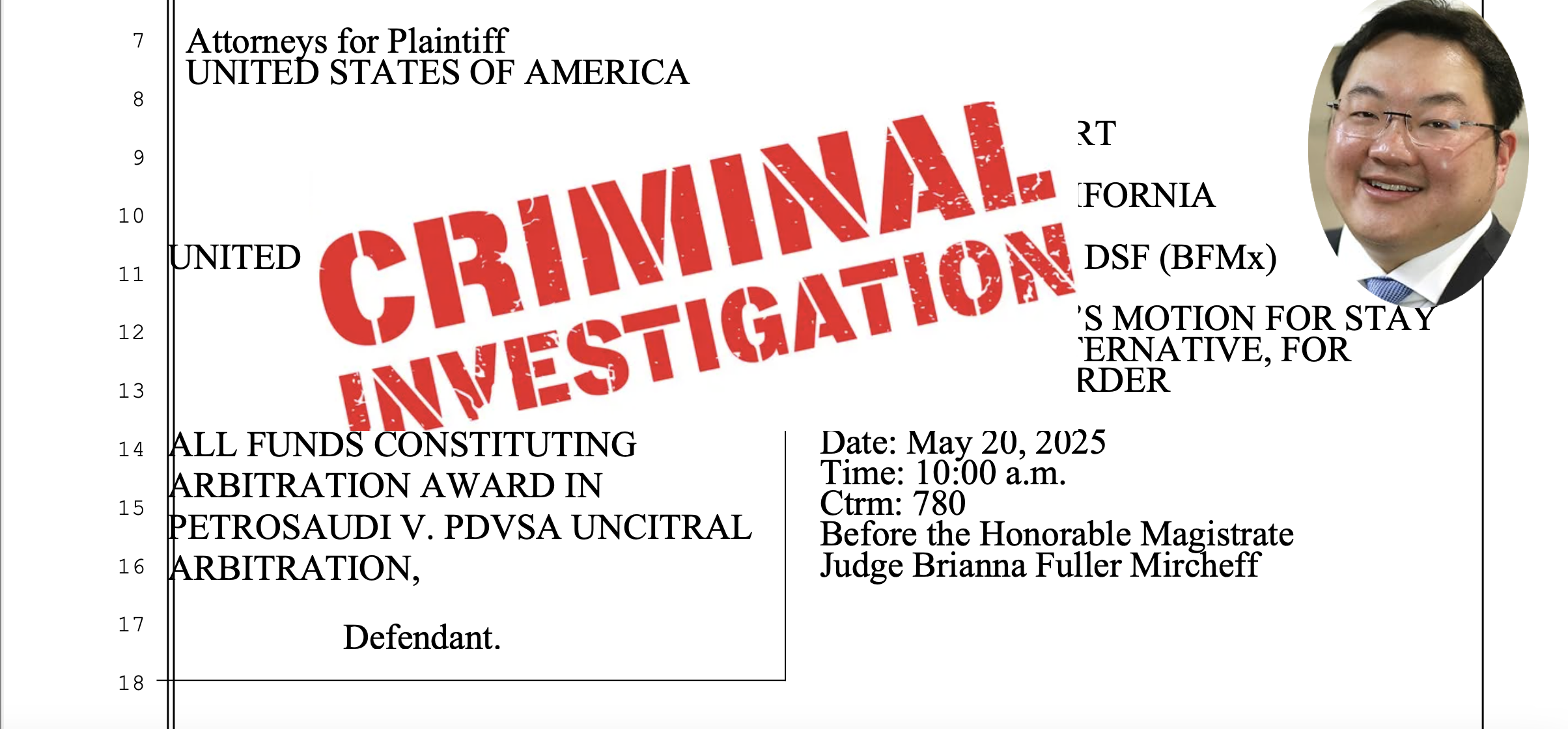Prosecutors in the United States made a surprise move to open new criminal proceedings against unidentified parties related to 1MDB yesterday.
The development was revealed thanks to a plea by for a six month stay of discovery over the latest asset seizure case concerning an account holding $340 million on behalf of PetroSaudi’s former law firm Clyde & Co in London. The sum represents profits made in Venezuela from invested funds that were originally stolen from 1MDB.
The judge, Dale Fischer, who has presided over a plethora of civil asset seizures to recover the stolen money since 2016, had originally expressed reluctance to give way on staying the latest case. However, she had given prosecutors time to fortify their case.
Laying out their grounds the DOJ lawyers made clear that Tarek Obaid and Patrick Mahony, already convicted by the Swiss courts (and awaiting an appeal) would be treated as key witnesses in the new criminal case.
The businessmen had claimed that PetroSaudi controlled assets with a net worth of $2.7 billion. However, the deposition states, “this was a lie—the assets were not worth anything near $2.7 billion and were not even owned by PetroSaudi. By making these false representations about the value and ownership of these assets, Obaid and others fraudulently induced 1MDB to contribute the aforementioned $1 billion to the joint venture.”
The statement continues to point out that “1MDB saw no return on its $1 billion investment. Instead $300 million of the $1 billion was diverted to Obaid’s control and the other $700 million was diverted to the control of Malaysian co-conspirator Low Taek Jho.”
All this is well known in Malaysia, as is the claim that “Obaid sent this $300 million to PetroSaudi bank accounts, through U.S. correspondent accounts, and ultimately used most of it to fund a drilling venture in Venezuela with the Venezuelan oil company PDVSA.”
What is less clear from the information presented in court is the actual target of the new criminal investigation and why it is considered prejudicial to the investigation for facts to emerge from the civil discovery process in advance of further progress in that criminal case.
The prosecutors explain that the criminal case does not overlap with the above civil asset seizure, which relates only to the original $300 million that was stolen from 1MDB’s original investment in the bogus joint venture with PetroSaudi.
Instead, they say:
“the Government is pursuing a criminal investigation that involves portions of the funds in the Good Star account and downstream accounts fed from the Good Star account.”
The prosecutors point out that there is already a long-standing criminal case against Jho Low for the $700 million that went into his own Good Star accounts and for other thefts from subsequent stages in the 1MDB conspiracy. It is possible the new charges relate to this case.
The deposition also divulges that at least two of the later stages of the 1MDB of the scheme, which they list under the heading of the Aabar-BVI, Tanore and Options Buy-out phases “are implicated in the Government’s pending criminal investigation.”
The narrative points out that the defendants from PetroSaudi are connected to some of the later crimes involving Jho Low and Good Star. For example, Obaid received at least $153 million of the later tranche of $330 million passed to Good Star in 2011, two year after the original billion dollar theft. These matters are not covered in the civil trial.
Obaid and his business partner Patrick Mahony are described as being “two of the core witnesses that the Government wishes to depose” in the criminal case and further stress the importance of delay because they will be unlikely to be able to do so until after their appeal in Switzerland against their conviction is completed.
It is left for observers to speculate who or which institutions might be vulnerable to future prosecution in the US in this new criminal case, which is stated as being separate from the original case that was first filed in 2018 against Jho Low and the Malaysian banker Roger Ng (now convicted) by the US Eastern District of New York.
A number of banks were instrumental in transferring huge questionable sums of 1MDB’s stolen money to facilitate these fraudulent transactions. It is possible such negligence could be termed criminal.
Moreover, all those who financially benefitted whilst acting as knowing accessories, and businessmen associated with PetroSaudi and Jho Low, should be feeling far less comfortable today.

